Publications
Highlights
For a full list see below
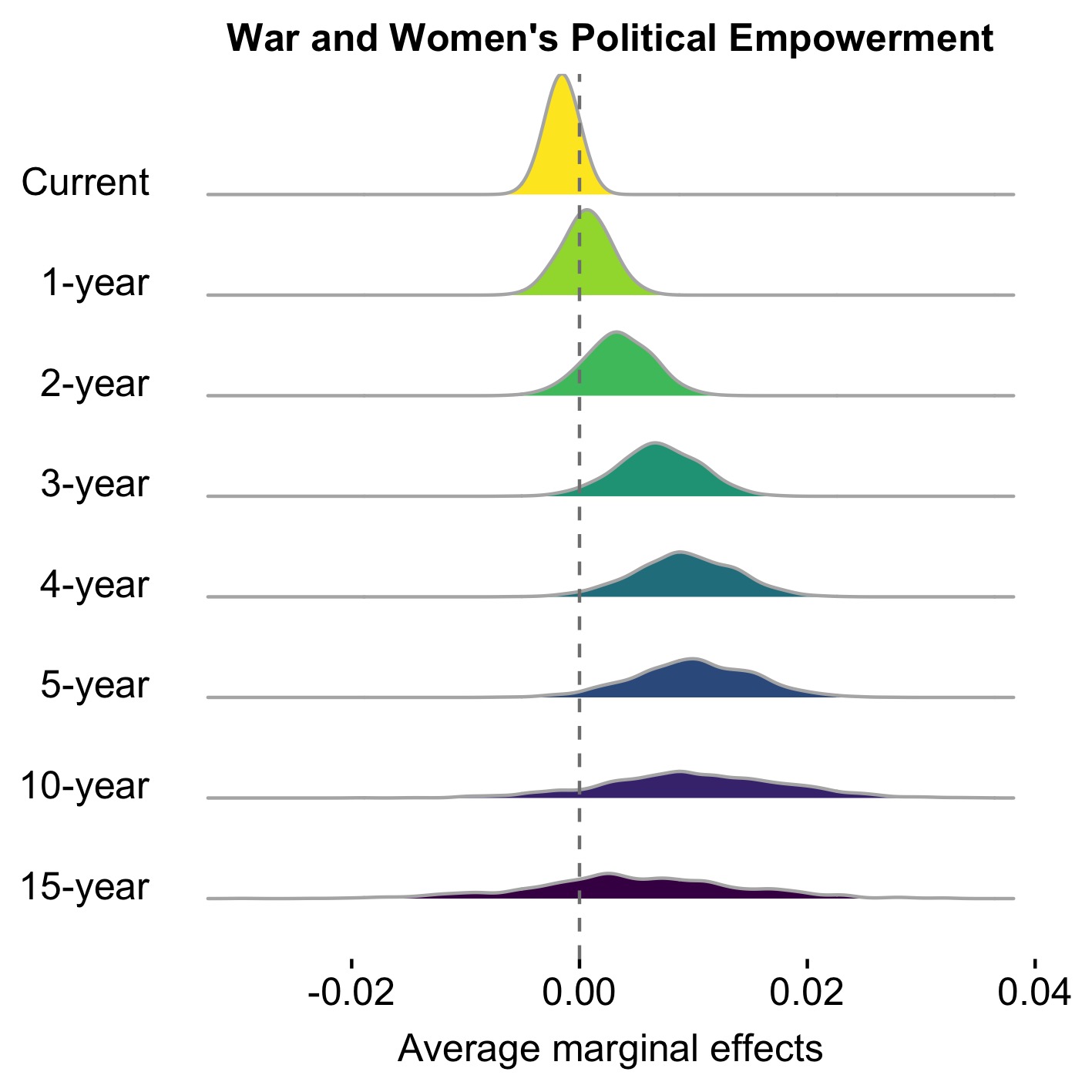
How do periods of conflict and peace shape women’s empowerment around the world? While existing studies have demonstrated that gender inequalities contribute to the propensity for armed conflict, we consider how the anticipation and realization of armed conflict shape women’s opportunities for influence in society. Some scholars have pointed to the role that militarization and threat play in entrenching male dominance, while others have argued that periods of warfare can upend existing gender hierarchical orders. We posit mechanisms by which the preparation for and experiences during war affect change in women’s empowerment. We develop and test observable implications using cross-national data from 1900 to 2015. We find that, at least in the short- and medium-term, warfare can disrupt social institutions and lead to an increase in women’s empowerment via mechanisms related to role shifts across society and political shifts catalyzed by war. Reforming institutions and mainstreaming gender during peace processes stand to have important legacies for gender power relations in postconflict societies, though much more may be needed for more permanent change.
Kaitlyn Webster, Chong Chen, and Kyle Beardsley
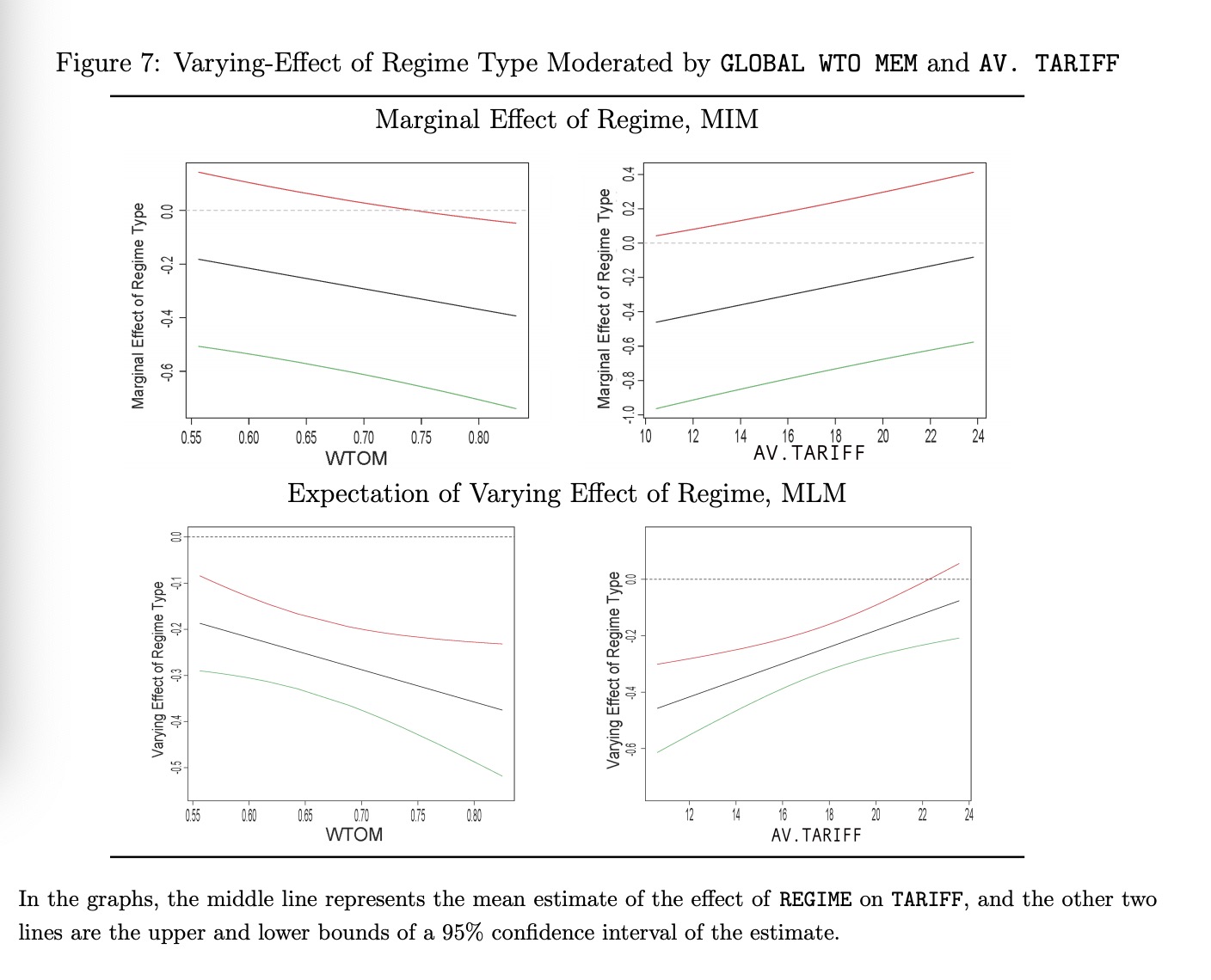
Following older debates in international relations literature concerning the relative importance of domestic versus systemic factors, newer debates emphasize interdependence among states and the complex interactions between systemic and domestic factors. As globalization and democratization advance, theories and empirical models of international politics have become more complicated. We present a systematic theoretical categorization of relationships between domestic and systemic variables. We use this categorization so that scholars can match their theory to the appropriate empirical model and assess the degree to which systemic factors affect their arguments. We also present two advances at the frontier of these empirical models. In one, we combine hierarchical models of moderating relationships with spatial models of interdependence among units within a system. In the other, we provide a model for analyzing spatial interdependence that varies over time. This enables us to examine how the level of interdependence among units has evolved. We illustrate our categorization and new models by revisiting the recent international political economy (IPE) debate over the relationship between trade policy and regime type in developing countries.
Stephen Chaudoin, Helen V. Milner and Xun Pang
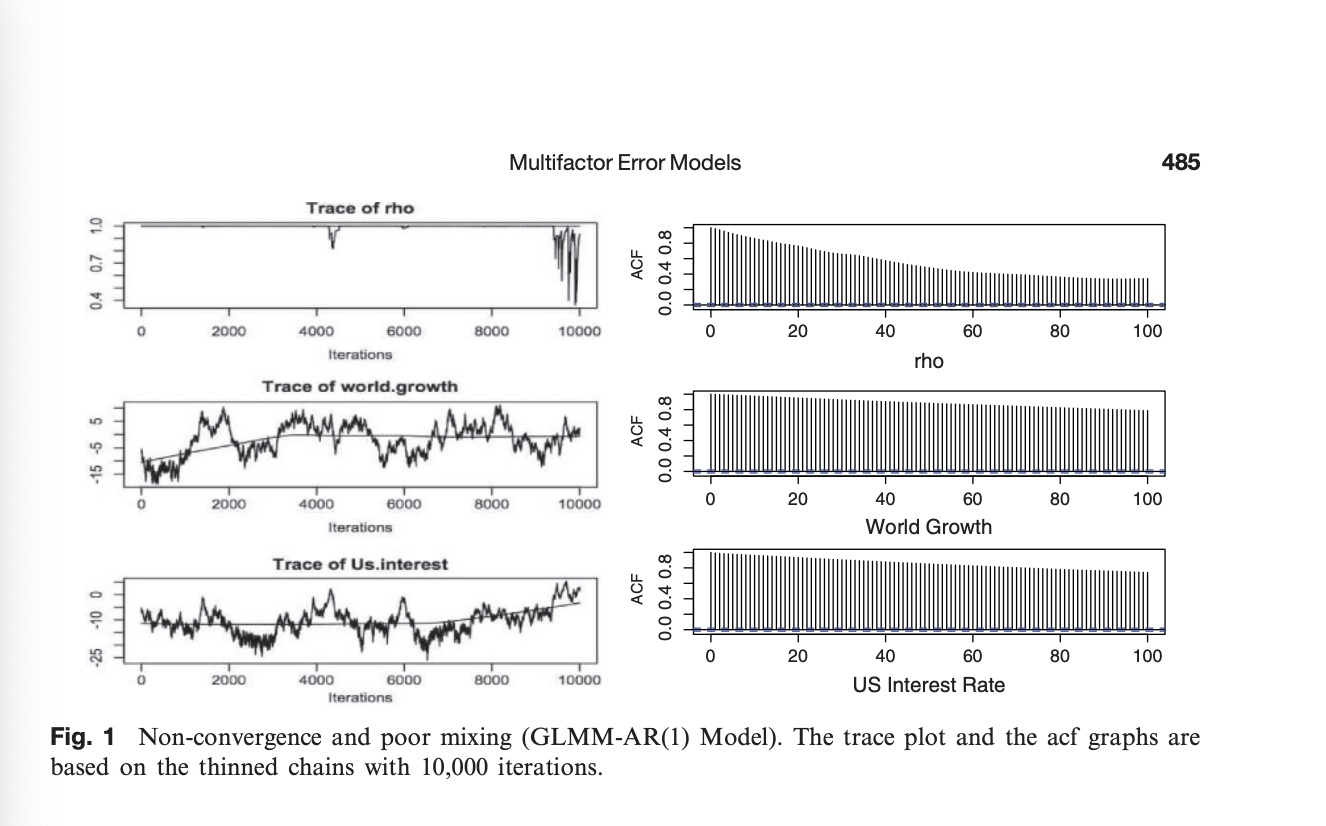
Multifactor error structures utilize factor analysis to deal with complex cross-sectional dependence in Time-Series Cross-Sectional data caused by cross-level interactions. The multifactor error structure specification is a generalization of the fixed-effects model. This article extends the existing multifactor error models from panel econometrics to multilevel modeling, from linear setups to generalized linear models with the probit and logistic links, and from assuming serial independence to modeling the error dynamics with an autoregressive process. I develop Markov Chain Monte Carlo algorithms mixed with a rejection sampling scheme to estimate the multilevel multifactor error structure model with a pth-order autoregressive process in linear, probit, and logistic specifications. I conduct several Monte Carlo studies to compare the performance of alternative specifications and approaches with varying degrees of data complication and different sample sizes. The Monte Carlo studies provide guidance on when and how to apply the proposed model. An empirical application sovereign default demonstrates how the proposed approach can accommodate a complex pattern of cross-sectional dependence and helps answer research questions related to units’ sensitivity or vulnerability to systemic shocks.
Xun Pang
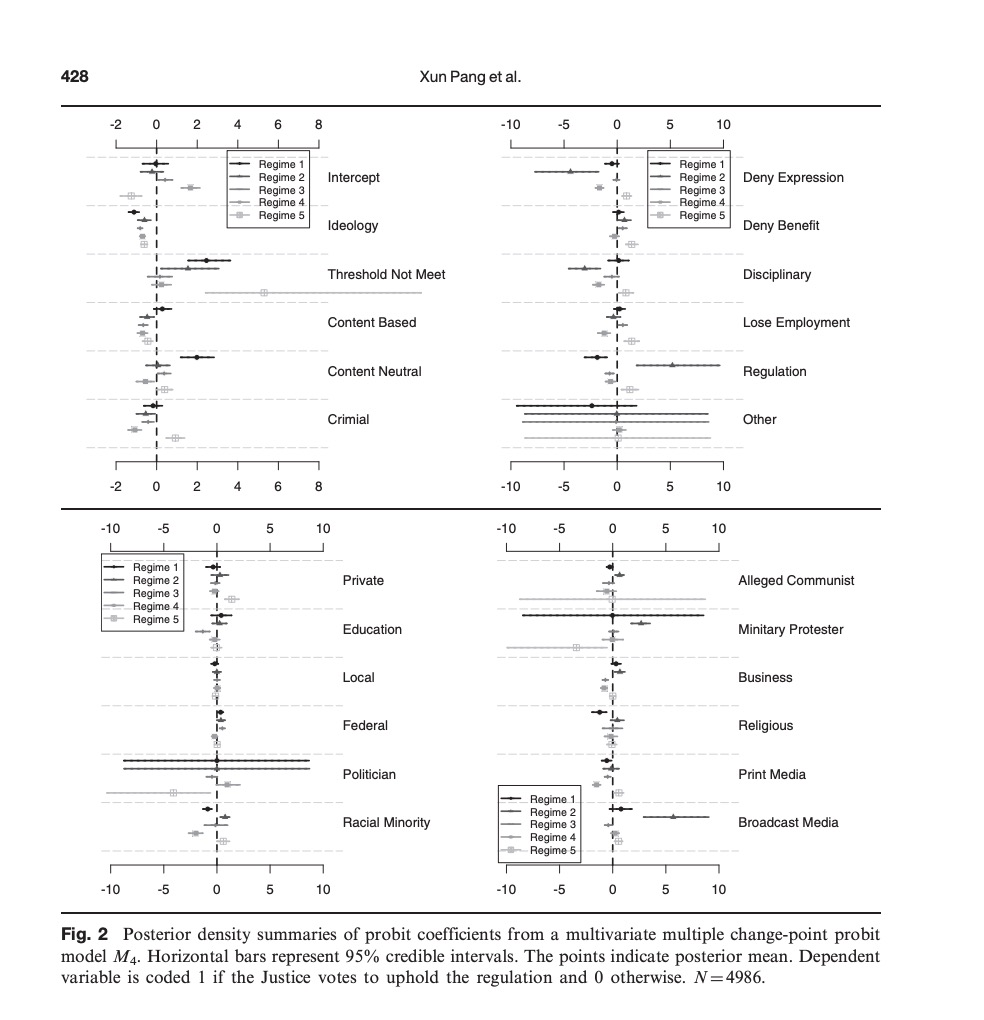
Jurisprudential regime theory is a legal explanation of decision-making on the U.S. Supreme Court that asserts that a key precedent in an area of law fundamentally restructures the relationship between case characteristics and the outcomes of future cases. In this article, we offer a multivariate multiple change-point probit model that can be used to endogenously test for the existence of jurisprudential regimes. Unlike the previously employed methods, our model does so by estimating the locations of many possible change-points along with structural parameters. We estimate the model using Markov chain Monte Carlo methods, and use Bayesian model comparison to determine the number of change-points. Our findings are consistent with jurisprudential regimes in the Establishment Clause and administrative law contexts. We find little support for hypothesized regimes in the areas of free speech and search-and-seizure. The Bayesian multivariate change-point model we propose has broad potential applications to studying structural breaks in either regular or irregular time-series data about political institutions or processes.
Xun Pang, Barry Friedman, Andrew D. Martin, and Kevin M. Quinn
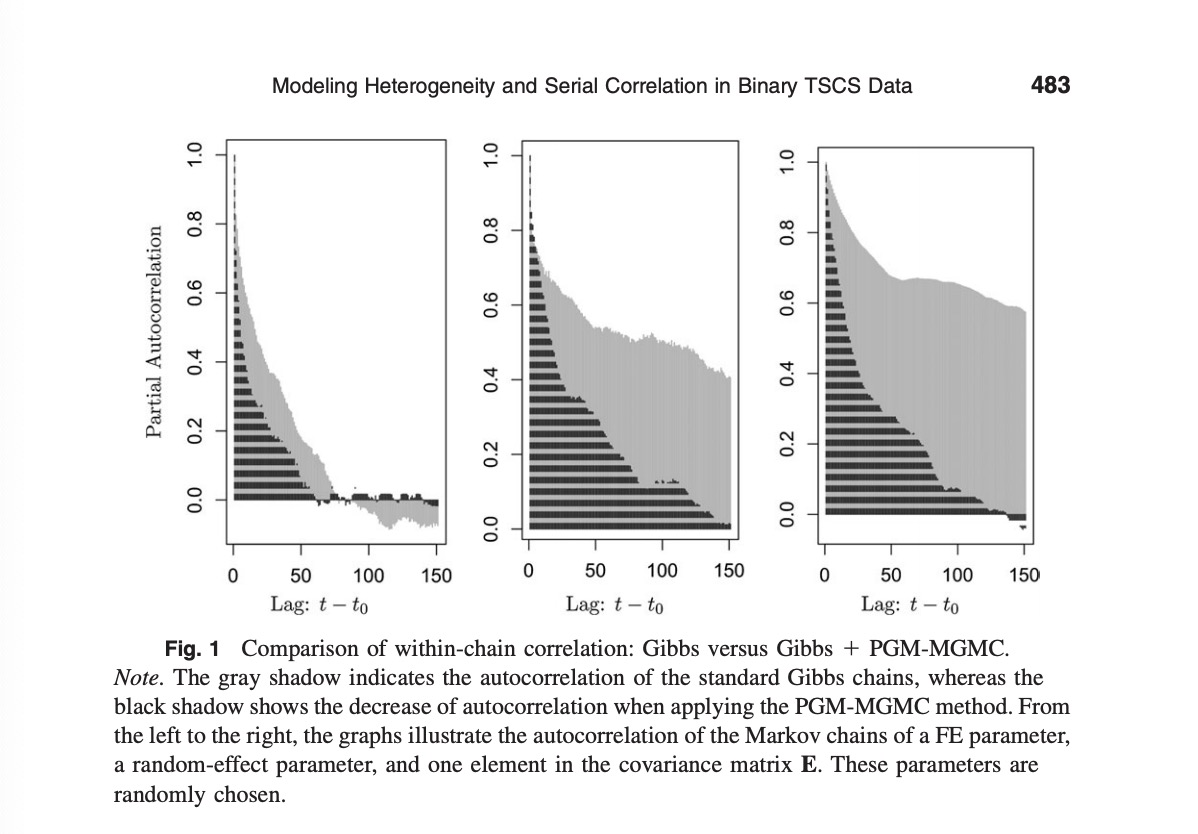
This paper proposes a Bayesian generalized linear multilevel model with a pth order autoregressive error process to analyze unbalanced binary time-series cross-sectional (TSCS) data. The model specification is motivated by the generic TSCS data structure and is intended to handle the associated inefficiency and endogeneity problems. It accommodates heterogeneity across units and between time periods in the form of random intercepts and random-effect coefficients. At the same time, its pth-order autoregressive error process, employed either by itself or in concert with other dynamic methods, adequately corrects serial correlation and improves statistical inference and forecasting. With a stationarity restriction on the error process, the model can also be used as a residual-based cointegration test on discrete TSCS data. This is especially valuable because cointegration testing on discrete TSCS data is methodologically challenging and rarely conducted in practice. To handle the estimation difficulties, I developed an efficient Markov chain Monte Carlo (MCMC) algorithm by orthogonalizing the error term with the Cholesky decomposition and adding an auxiliary variable. The parameter expansion method, that is, partial group move—multigrid Monte Carlo updating (PGM-MGMC), is employed to further improve MCMC mixing and speed up convergence. The paper also provides a computational scheme to approximate the Bayes’s factor for the purposes of serial correlation diagnostics, lag order determination, and variable selection. Simulated and empirical examples are used to assess the model and techniques.
Xun Pang
Full List
Publications in English
-
Kaitlyn Webster, Priscilla Torres, Chong Chen, and Kyle Beardsley, “Ethnic and Gender Hierarchies in the Crucible of War,” International Studies Quarterly, Online first, 2020, pp. 1-13.
-
Chong Chen and Kyle Beardsley, “Once and Future Peacemakers: Continuity of Third-party Involvement in Civil War Peace Processes,” International Peacekeeping, Vol. 27, No. 4, 2020, pp.1-27.
-
Feng Liu, “The Recalibrating of Chinese Assertiveness: China’s Responses to the Indo–Pacific Challenge,” International Affairs, Vol. 96, No. 1, 2020, pp. 9-27.
-
Feng Liu and Ruonan Liu, “China, the United States, and Order Transition in East Asia: An Economy-Security Nexus Approach,” The Pacific Review, Vol. 32, No. 6, 2019, pp. 972-995.
-
Kaitlyn Webster, Chong Chen, and Kyle Beardsley, “Conflict, Peace, and the Evolution of Women’s Empowerment,” International Organization, Vol. 73, No. 2, 2019, pp. 255-289.
-
Xun Pang and Shuai Wang, “The International Political Significance of Chinese and US Foreign Aid: As Seen in United Nations General Assembly Voting,” Social Sciences in China, Vol.39, No.1, pp.5-33, 2018.
-
Chong Chen, “Territorial Dispute Initiation by Weaker States,” The Chinese Journal of International Politics, Vol. 11, No. 3, 2018, pp. 339-372.
-
Haixia Qi, “Disputing Chinese Views on Power,” The Chinese Journal of International Politics, Vol. 10, No. 2, 2017, pp. 211–239.
-
Qingqian He, “Issue cross-pressures and time of voting decision,” Electoral Studies, Vol. 44, 2016, pp. 362-373.
-
Stephen Chaudoin, Helen V. Milner, and Xun Pang, “International Systems and Domestic Politics: Linking Complex Interactions with Empirical Models in International Relations ,” International Organization, Vol. 69, No. 2, 2015, pp. 275-309.
-
Xun Pang, “Varying Responses to Common Shocks and Complex Cross-Sectional Dependence: Dynamic Multilevel Modeling with Multifactor Error Structures for Time-Series Cross-Sectional Data,” Political Analysis, Vol. 22, Issue 4, 2014, pp.464-496.
-
Xuetong Yan and Haixia Qi, “Football Game Rather Than Boxing Match: China–US Intensifying Rivalry Does not Amount to Cold War,” Chinese Journal of International Politics, Vol.5, No, 2, 2012, pp. 105–127.
-
Xun Pang, Barry Friedman, Andrew D. Martin, and Kevin M. Quinn, “Endogenous Jurisprudential Regimes,” Political Analysis, Vol. 20, Issue 4, 2012, pp. 417-436.
-
Xun Pang, “Modeling Heterogeneity and Serial Correlation in Binary TSCS Data: A Bayesian Multilevel Model with AR(p) Errors,” Political Analysis, Vol. 18, Issue 4, 2010, pp. 470-498.
Publications in Chinese
-
Xun Pang and Chong Chen, “The Hirschman Effect of International Finance,” World Economics and Politics (世界经济与政治), No. 6, 2020, pp. 132-155.
-
Chong Chen and Xun Pang, “Predicting the Timing and Location of Terrorist Attacks in Africa in the Age of Big Data: Combing GIS and Split Population Duration Models,” Foreign Affairs Review (外交评论), No. 2, 2020, pp. 121-154.
-
Qingqian He and Daniel Naurin, “Brexit and Redistribution of EU Power: A Social Network Analysis Based on Survey Data,” Chinese Journal of European Studies(欧洲研究),No. 1, 2020, pp.27-54.
-
Xuefeng Sun and Xikun Zhang, “China and US Strategic Choices and China’s Relations with Its Neighbors,” Contemporary International Relations (现代国际关系), Vol.29, No. 5, 2019, pp. 36-46.
-
Xun Pang Ziye Liu, “China-US Relations In Massive Machine-Coded Event Data: Influence of Reciprocity, Domestic Politics, and Russia ,” World Economic and Politics (世界经济与政治), No.5, pp.53-79, 2019.
-
Chong Chen, ”Rethinking Opportunity, Greed, Grievance and Internal Conflict: A Spatio-Temporal Analysis of African Political Violence,” World Economics and Politics (世界经济与政治), No. 8, 2018, pp. 94-127.
-
Haixia Qi, “Big Data and Innovation of International Relations Theory,” Social Science in China(中国社会科学), No.6, 2018, pp.160-170.
-
Qingqian He, “Cultural Resistance or Cultural Backlash? The Comparison of Causal Effects of the Rise of Populist Radical Right in Western Europe,” World Economics and Politics (世界经济与政治),NO.12, 2017, pp.103-131.
-
Haixia Qi and Hao Qi, “Alliance Signals, Audience Costs and Maritime Disputes of China-Japan and China-Philippines,” World Economics and Politics (世界经济与政治), Vol.8, 2017, pp.106-130.
-
Xun Pang and Shuai Wang, “The International Political Implications of Chinese and American Foreign Aid: The Case of Voting in the United Nations General Assembly,” Social Sciences in China (中国社会科学), No.3, pp.181-203, 2017.